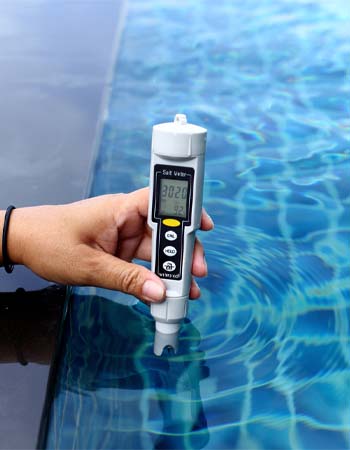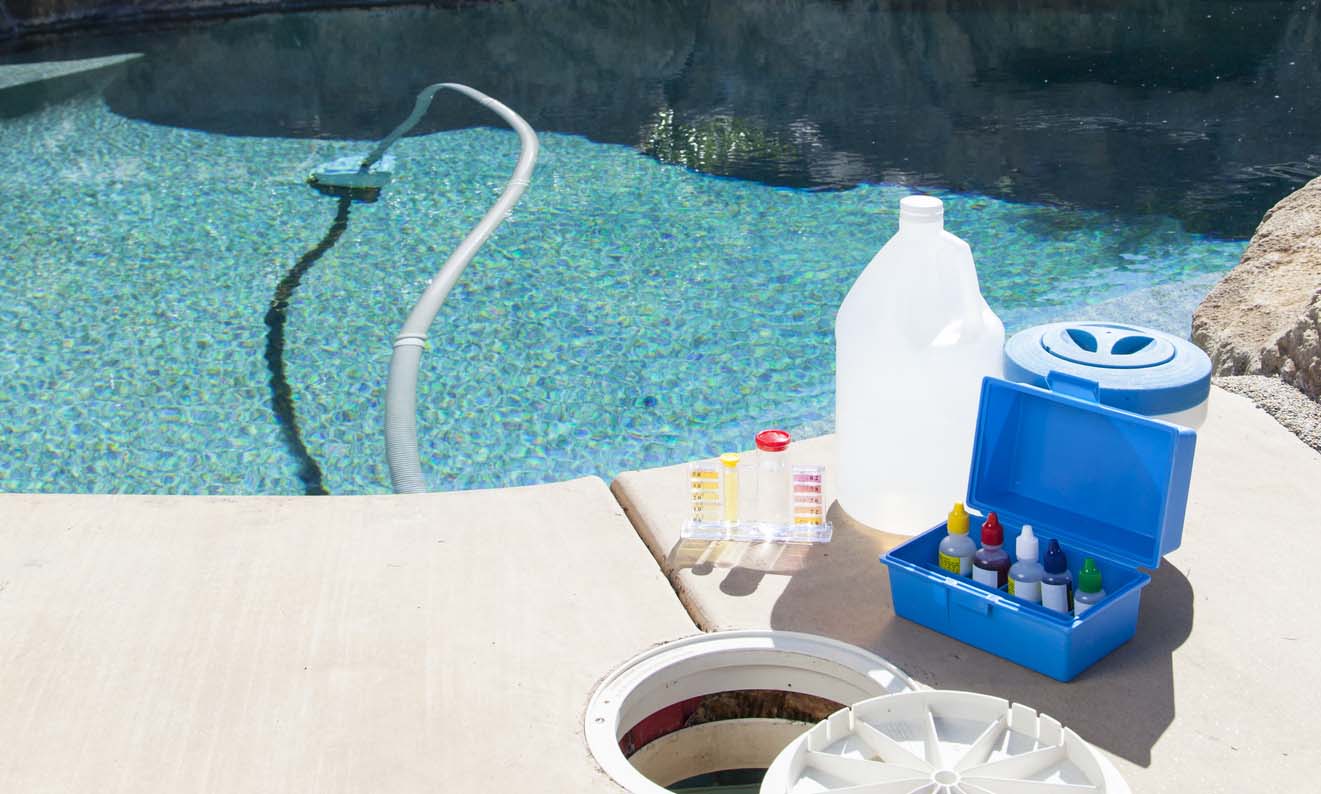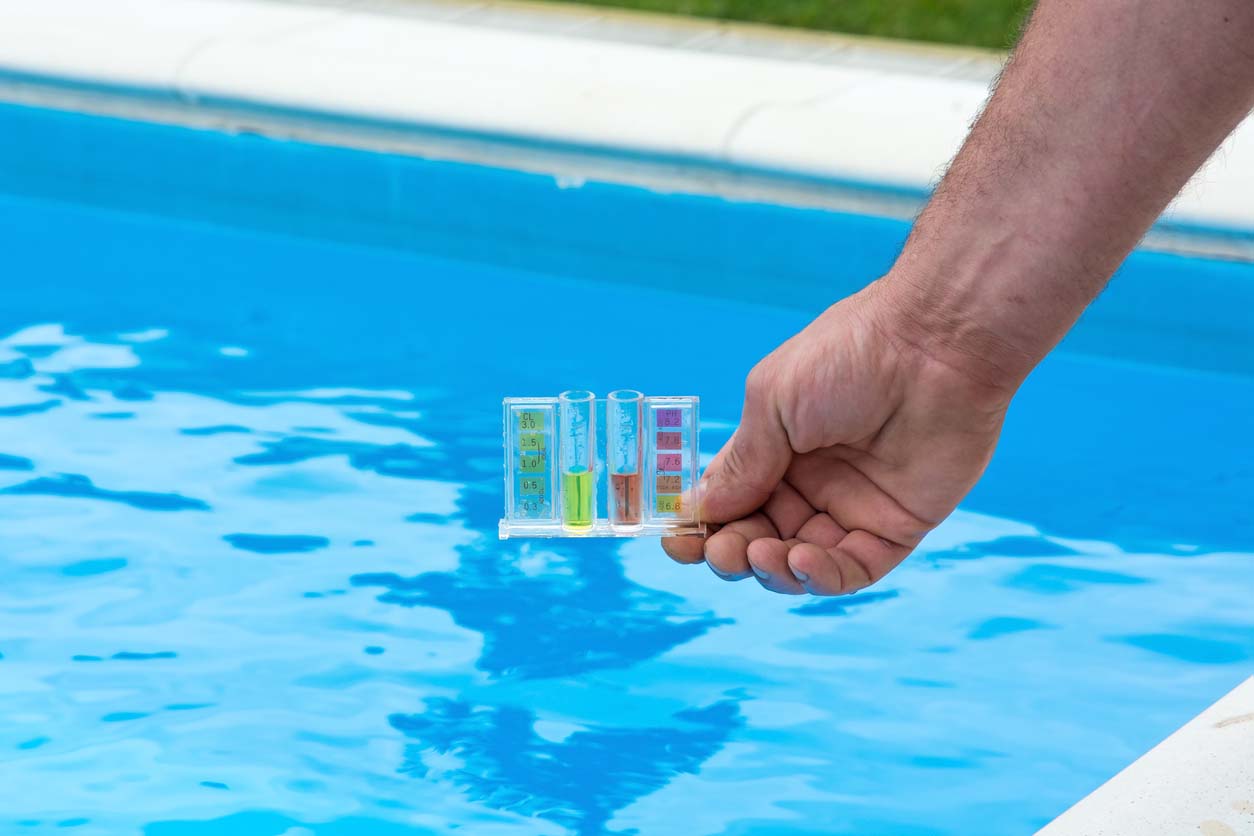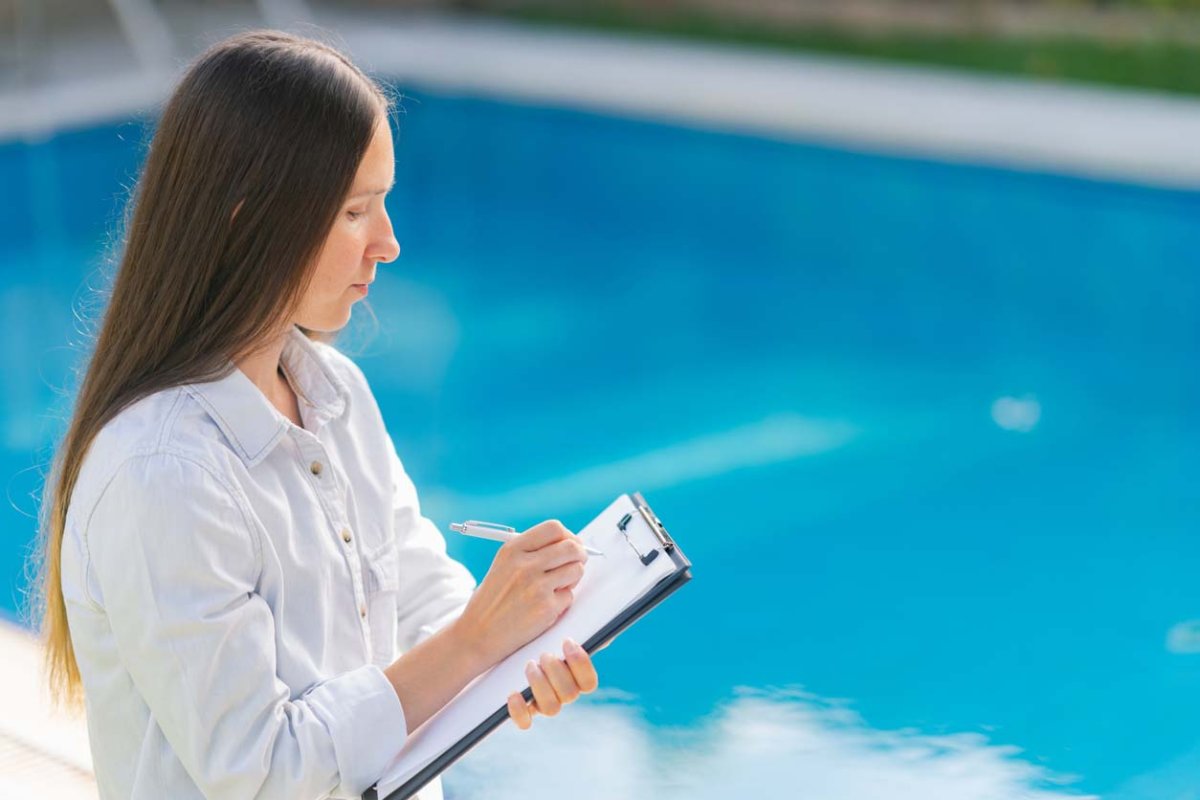We may earn revenue from the products available on this page and participate in affiliate programs. Learn More ›
Highlights
- The typical cost range for a swimming pool inspection is between $125 and $250.
- The main factors that affect pool inspection cost include the pool size, the home’s geographic location, the need for any special equipment, and the addition of a home inspection.
- A pool inspection may be necessary in the case of a new home purchase, a home buyer using an FHA loan, a damaged pool liner, green or dirty water, cold water, or burnt-out light bulbs.
- A homeowner can handle some elements of pool inspection themselves by checking the pool equipment regularly; however, it’s advisable to get a professional pool inspection once a year to identify any potential issues.
Having a pool can be a great way to exercise at home, spend time with the kids, or simply relax and float around under the warm sun. However, this home feature requires regular upkeep and maintenance to ensure that it continues functioning properly. This will ideally include an annual pool inspection by a professional swimming pool inspection company.
According to Angi, hiring a pool inspector typically costs about $125 to $250. During the appointment, the inspector will check the pool equipment, pool deck, tiling, pool liner, fencing, pool lighting, and the surrounding area for any issues. They will provide a written report of their findings, which generally includes suggested next steps to resolve any problems that the inspection reveals. Including a yearly pool inspection in their list of maintenance tasks is an excellent way for homeowners to extend the lifespan of their pool. Homeowners can review this informative guide before hiring a professional pool inspection company to better understand how the pool inspection cost can vary depending on factors like pool size and geographic location.
Factors in Calculating Pool Inspection Cost

The average cost for pool inspection services ranges from about $125 to $250 depending on several important factors. When homeowners are researching local pool inspection companies, it’s important for them to find out if the prices vary for larger pools, pool systems with a hot tub or spa, or pools with special equipment. Additionally, they’ll want to keep in mind that the cost of the service generally differs based on geographic location, though a homeowner may be able to reduce the pool inspection cost by bundling this service with a home inspection.
Pool Size
An inspection isn’t the same as cleaning, resurfacing, or tiling the pool. There’s no need for additional materials or cleaning products for larger pools, so the cost doesn’t increase incrementally per square foot. However, the pool size still impacts the cost of the inspection, especially if the pool system includes a hot tub or spa. Before hiring a pool inspection company, homeowners will want to speak to the inspector or the customer service staff to determine if they offer a flat rate for inspection services or if there is a price increase for larger pools.
Some companies may charge a flat rate for an inspection, but other professional pool inspectors may increase the price of the service by 10 to 25 percent, depending on the size and scope of the pool system. Getting an up-front, written quote from at least three reputable pool inspection companies is the best way for homeowners to ensure they are getting the most for their money.
Geographic Location
The cost of many services varies based on supply and demand, so if the city or town a homeowner lives in has a high number of pool inspection companies, but a low number of pool owners, then the cost of the inspection will likely be on the low end because there is a higher supply than there is a demand. However, for cities with significantly more pool users than reputable pool inspection companies, the cost of an inspection will typically be on the high end of the cost range.
Due to this natural balance between supply and demand, it’s typical to find higher prices in densely populated areas, while rural communities often enjoy lower prices for the same service. Though, it should be mentioned that a rural location doesn’t always guarantee a lower price. If a home is too far from the closest pool inspection company, then the customer may be charged an additional fee for the company to drive outside of its service area.
Special Equipment
A basic pool consists of the pool structure, pool deck, the pump and filtration system, and an electrical outlet to power the pool equipment. This setup is relatively easy for a pool inspector to quickly examine and advise on, but if a homeowner’s pool setup has any special equipment, the cost of the inspection can increase.
Before hiring a professional pool inspector, homeowners will want to speak to the customer service staff or ask the inspector directly about what equipment is included in the cost of the inspection and if there are any added costs for special pool equipment. They can then compare the prices between at least three potential inspection companies to find the right one for the job. Special equipment includes:
- Heaters
- Salt generators
- Fountains
- Diving boards
- Remote controls
- Slides
- Built-in windows
- Automation features
Home Inspection
When someone is buying or selling a home, they often hire a home inspector to complete an inspection on the house, yard, and property to ensure that everything is up to code and there are not any hidden issues. If the home has a pool, it can be inspected separately by a pool inspection company, or the customer may be able to find a company that offers both home inspection and pool inspection services.
Saltwater Corrosion Check
Having a saltwater generator for a pool is an effective way to keep the pool water clean without relying on high amounts of liquid chlorine for sanitizing. Instead, the saltwater generator uses electrolysis to split sodium chloride in order to release a balanced amount of chlorine into the pool water. This method of sanitizing the pool reduces overall maintenance and may increase the lifespan of the pool system.
However, if the saltwater pool is not properly maintained, the presence of salt in the system can cause corrosion. The corrosive effects of the salt can affect the saltwater generator, pump, filtration system, pool interior, pipes, fittings, and any other parts that are exposed to the high salt content for an extended period of time. While the corrosive results of the salt may not be immediately visible, the pool inspector will be able to identify this issue and suggest methods to reduce saltwater corrosion.
Pool Equipment Check
Ensuring that the pool equipment is in good condition is one of the primary reasons for a homeowner to hire a professional pool inspector. The inspector will check the main drain, motors, pumps, timer system, wiring, and heater, if applicable, for any signs of significant wear and tear. They can also inspect the pipes, fittings, and the exterior of the pool for leaks, though this may come at an additional cost.
Typically, if a company is charging extra for leak detection, it will cost about $300 on average, though the cost of this service can increase to $1,000, depending on the type of pool, presence of specialized pool equipment, and the extent of the inspection. The pool inspector should also ensure all electrical codes have been followed, the wires are properly grounded, the light fixtures are fully sealed, and that GFCI outlets are installed for the pool.

Do I Need a Pool Inspection?
Adding the cost of a pool inspection to the existing maintenance costs to own and operate a pool may seem unnecessary for some pool owners, but having a professional inspect the pool system at least once a year can help identify problem areas before they can grow in severity. Pool inspections are also a good idea if the customer is purchasing or selling the home, or if they spot any issues that they aren’t sure how to resolve, such as a damaged liner or recurring problems with green or dirty water. Regular inspections can help protect the homeowner’s initial investment in outdoor or indoor pool cost.
New Home Purchase
It’s recommended to hire a professional inspector to complete a pool inspection for home purchase or prior to selling a home. The inspector will be able to detect any problems with the existing pool system so that the seller can make necessary repairs. If a home buyer is purchasing a house with a pool, they can discuss the results of the inspection with the seller to see if they would be willing to make any necessary fixes or reduce the cost of the home by the approximate cost of the repairs.
Jumping into the purchase of a home that has a pool without a proper home inspection or pool inspection is not advised. While opting out of these inspections can save the buyer money in the short term, any underlying problems or issues that have not been identified could linger, causing more severe damage to the pool system or simply worsening over time. By the time the problem becomes big enough for even the untrained eye to notice, a new homeowner could be looking at a hefty repair bill.
FHA Loan
Obtaining an FHA loan to help purchase a home is a good way to get into the housing market, but home buyers need to be prepared to follow strict guidelines and to provide any requested information about the home. If the house has an existing inground pool, then there is a good chance that the home buyer will be required to submit a completed pool inspection report before the loan is approved.
However, if the home only has an above-ground pool, then an inspection may not be required. Above-ground pools are generally considered personal property, and since they can be removed easily and for a relatively low pool removal cost, they do not have a significant impact on the value of the property. However, it’s still a good idea for a buyer to get a pool inspection before purchasing the home to ensure the above-ground pool is in good working condition.
Damaged Liner
Not every pool has a liner. Some pool manufacturers use durable construction materials such as tile, concrete, or fiberglass to make the interior of the pool, instead of relying on a liner. However, liner pools are one of the most common options, so it’s important for the pool inspector to check the liner for any tears, scratches, leaks, abrasions, or any other type of damage.
Pools with liners can last more than 20 years with proper maintenance, but the liner will need to be replaced about once every 6 to 12 years. With this in mind, it comes as no surprise that the liner may start to show signs of wear and tear after 6 years of use. The pool inspector can determine if the wear is bad enough to warrant the replacement of the liner or if the existing damage is minor enough that it can be fixed with a pool liner patch.
Green or Dirty Water
A pool is a fun place to play with the kids, exercise in, and lounge around during the summer months, but if it is not properly maintained the water can become too dirty for safe swimming. If left without treatment, the water can even pose a health risk to swimmers, leading to symptoms such as diarrhea, ear infections, respiratory infections, rashes, inflamed eyes, and inflamed lungs.
If a homeowner notices that the water is green or noticeably dirty, they’ll want to take immediate steps to clean the pool, test the water chemistry, and treat the pool water. However, if green or dirty water is a recurring problem, it’s a good idea for the homeowner to hire a professional pool inspector to determine if there is an underlying issue that is causing the pool to turn green or grow dirty at an accelerated rate. Common causes include:
- Algae overgrowth
- Pollen
- Oxidizing metals
- Low free chlorine levels
- High pH levels
- Broken filter
- High phosphate levels
- Overhanging trees or plants
Cold Water
When water is first added to the pool, it will start out cold and gradually warm up under the heat of the sun. A homeowner can increase the speed at which the pool water heats up by adding a solar blanket or by investing in a pool heater. Whereas a solar blanket helps to insulate the pool water and magnify the effects of the sun, a pool heater uses electricity to heat the water.
If a homeowner has a pool heater, but the water has felt cold the last few times they used the pool, then there may be a problem with the heater. They’ll want to call a professional pool inspector to do a thorough inspection of the pool exterior, interior, and pool equipment, including the pool heater. The inspector will be able to determine if there is a problem, what the problem is, and how to go about resolving the issue.
Burnt-Out Light Bulbs
Swimming doesn’t have to come to an end just because night is falling if a homeowner invests in pool lighting. However, like all light bulbs, pool light bulbs can burn out, requiring replacement. This is a relatively common occurrence that most pool owners can deal with on their own, but if the pool has LED lights or the new light bulbs rapidly burn out after being replaced, there may be potential electrical issues that need to be addressed.
A pool inspection can reveal these issues and provide the homeowner with possible suggestions for how to repair the electrical system. Depending on the company, the inspector may even be able to put together an estimate for the repair. Leaving electrical issues unchecked is not recommended. A short circuit could cause a fire or may even lead to accidental electrocution. If a homeowner suspects their pool setup has an electrical problem, they’ll want to take steps to resolve the issue immediately.
Pool Inspection: DIY vs. Hiring a Professional
While many jobs around the home fall into either the DIY or the professional category, pool inspection is something that will ideally be managed in part by both the pool owner and a professional pool inspector. Most of the year, a homeowner can handle a basic pool inspection on their own by simply checking the pool equipment before and after every use, testing the water chemistry about once every week, treating the water as necessary, cleaning the pool once a week, and inspecting the pool lights, liner, and decking for any issues.
However, about once a year it’s a good idea for the homeowner to hire a professional swimming pool inspector to do a thorough inspection of the entire system. A professional knows how to find a leak in a pool and how to address any other concerns pertaining to the pool, so the homeowner can take action to resolve the issue. Even if there aren’t any problems to fix, it can give the homeowner peace of mind to have a trained professional pool inspector confirm that there isn’t anything wrong with the pool system. Working with a professional pool inspector will give homeowners a much better idea of the condition of the swimming pool, including the equipment and the surrounding area.
How to Save Money on Pool Inspection Cost
Adding an annual home pool inspection to your pool maintenance checklist can help you stay on top of key repairs and upgrades, but this service increases the annual cost of having a pool. Given that pool maintenance typically costs about $1,200 to $1,800 per year, it’s important to find ways to reduce the cost of pool inspection. Consider these methods for saving money on the pool inspection cost before hiring a pool safety inspector.
- Get multiple quotes. It’s recommended to research a small selection of pool inspection companies and get quotes for certified pool inspections from each to ensure you get the most complete inspection for your money.
- Keep up with minor maintenance tasks. Before hiring a pool inspector, check to make sure the lights in the pool are working, regularly test the water chemistry, treat the pool water as needed, and clean the pool at least once a week, depending on the frequency of use.
- Bundle house inspection and pool inspection costs. If you are buying or selling a home, you will likely want to hire one of the best home inspection services to ensure everything is up to code and working properly. Some companies may offer a discounted price for both house inspection and pool inspection costs if you purchase both of these services.

Questions to Ask About Pool Inspection
Hiring a professional pool inspection company to identify any problems with a system is a good way for a homeowner to keep up with pressing pool maintenance concerns before they can reduce the lifespan of the pool system. However, it’s important for a homeowner to understand the scope of the pool and spa inspection, as well as get up-front pricing, so that there aren’t any surprises at the end of the inspection. Homeowners can ask the following questions to the swimming pool inspector or speak to the customer service staff to ensure they know what to expect during the appointment.
- What parts of the system will you check?
- Do you have a pool inspection certification?
- Can I see a sample report?
- Can I attend the inspection?
- What will the total cost be?
- Can I get a written quote?
- What are the state and local pool regulations?
- Can I have a copy of the above-ground or inground pool inspection checklist?
- Is the fence far enough away from the pool?
- Is the pool equipment in good condition?
- Are there any cracks or breaks in the pool deck?
- Are there any leaks in the pool or pool equipment?
- What steps should I take to clean or repair the pool?
- Are there any slipping or tripping hazards?
- Does the liner need to be replaced?
- Is there any notable saltwater corrosion?
- Do the drain suction outlets and pool equipment comply with state and local pool regulations?
FAQs
Homeowners can keep their pool in good condition for years to come by keeping up with regular pool maintenance such as cleaning the pool, testing the water chemistry, treating the water, and winterizing the system before the colder months hit. However, if they see any issues that they aren’t sure how to handle, they’ll want to consider calling in a professional pool inspector to check the system and advise on the appropriate steps to take to resolve the problem. For more information, homeowners can take a look at the following answers to some of the most commonly asked questions about pool inspection and pool inspection cost.
Q. How often should I perform a pool inspection?
A pool owner will want to inspect their pool before and after every use. This will help them stay on top of pool maintenance tasks throughout the year. However, a homeowner will only need a professional pool inspection about once a year.
Q. What is the average lifespan for a pool?
The lifespan of a pool typically depends on the pool installation construction. Pools that have vinyl liners can generally last more than 20 years, but the liner will need to be replaced every 6 to 12 years. Concrete pools will often last 20 to 25 years, though the concrete will need to be resurfaced once every 10 years. Fiberglass pools tend to last the longest, with a lifespan that typically exceeds 30 years. The best pool installation companies can advise homeowners on the lifespan of their pool when they first install it.
Q. Is it OK to pressure-wash my pool?
Pools that are made with plaster, exposed aggregate, or concrete may be able to withstand the power behind a pressure washer, but in most cases it isn’t recommended to pressure-wash the pool. There are a wide range of pool vacuums and pool cleaners that can help with pool maintenance, so a homeowner doesn’t need to risk damaging the pool with a pressure washer to keep it clean. Homeowners can also hire one of the best pool cleaning services to help maintain their pool.
Q. What is the average cost of pool inspection?
The cost for pool inspection can vary depending on the size of the pool, geographic location, and the presence of any specialized pool equipment. Typically, the cost ranges from $125 to $250.
Q. What happens if a pool is not maintained properly?
When a pool is not maintained properly, it can lead to ongoing problems with the pump and filtration system. Unbalanced chemical levels can also cause damage to the liner of the pool and may be hazardous to any swimmers. If left untreated, a dirty pool can cause a list of illnesses referred to as recreational water illnesses (RWIs), including diarrhea, ear infections, respiratory infections, rashes, inflamed eyes, and inflamed lungs. For this reason, it’s best for homeowners to keep up with pool maintenance costs to avoid problems with the pool and issues with their health.
Q. What is the cheapest way to clean my pool?
If a homeowner is just looking for the cheapest possible way to clean the pool tile, grout, concrete, or stone, then scrubbing the surfaces with a paste made of one part water and one part baking soda is the best method. Baking soda will also increase the alkalinity of the pool by 10 parts per million (ppm). This is achieved by adding about 1.5 pounds of baking soda for every 10,000 gallons of water.
Sources: Angi, Yelp, Zagers Pool & Spa, Swim University


